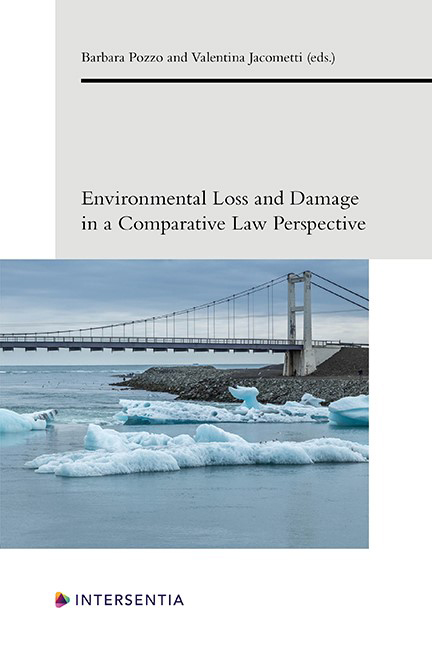Book contents
- Frontmatter
- Preface
- Contents
- List of Authors
- PART I LIABILITY FOR ENVIRONMENTAL HARM IN THE EU
- PART II PRIVATE AND CORPORATE ENVIRONMENTAL LIABILITY
- PART III THE ROLE OF CRIMINAL LIABILITY
- PART IV LEGAL TRANSPLANTS IN THE ENVIRONMENTAL FIELD: THE CASE OF ENVIRONMENTAL LIABILITY
- PART V STATE AND INTERNATIONAL ENVIRONMENTAL LIABILITY
- PART VI CLIMATE CHANGE LIABILITY
- PART VII LIABILITY, CLIMATE CHANGE AND NATURAL HAZARDS: THE ROLE OF INSURANCE
- PART VIII REAL COMPENSATION AND OFFSET REGIMES: THE STRATEGY OF “NO NET LOSS”
- About the Editors
Ecological Environmental Damage Liability Rules in the Light of the Private Law Regime: Problems and Experience in China
Published online by Cambridge University Press: 26 May 2021
- Frontmatter
- Preface
- Contents
- List of Authors
- PART I LIABILITY FOR ENVIRONMENTAL HARM IN THE EU
- PART II PRIVATE AND CORPORATE ENVIRONMENTAL LIABILITY
- PART III THE ROLE OF CRIMINAL LIABILITY
- PART IV LEGAL TRANSPLANTS IN THE ENVIRONMENTAL FIELD: THE CASE OF ENVIRONMENTAL LIABILITY
- PART V STATE AND INTERNATIONAL ENVIRONMENTAL LIABILITY
- PART VI CLIMATE CHANGE LIABILITY
- PART VII LIABILITY, CLIMATE CHANGE AND NATURAL HAZARDS: THE ROLE OF INSURANCE
- PART VIII REAL COMPENSATION AND OFFSET REGIMES: THE STRATEGY OF “NO NET LOSS”
- About the Editors
Summary
INTRODUCTION
Ecological or ecological environmental damage liability has become a fast-evolving theme both in international and national environmental law. Many traditional questions have been reiterated and redeveloped in this field, including liability principles (fault or no-fault), causality, legal standing, damage calculation and so on. In theory, there are basically two types of ecological damage liability. First, there is liability for restoring the damaged ecological environment, i.e. to restore the damaged ecological environment to the state provided that has no damage,3 or to a state that required by law. For some damage which cannot be restored, the liable parties can also be required by law to restore other places alternatively. Second, there is monetary compensation liability: when ecological damage cannot be restored (and there is no applicable alternative restoration), or the restoration is not cost-effective, then liable parties shall pay monetary compensation for the losses of ecological services. Restoration liability is the primary form of liability in modern environmental law. However, ecological damage liability does not specifically belong to private law or public law. In different countries, ecological damage liability rules may be stipulated either in private law or in public law, or in both.
China has a tradition of protecting ecological public interest through public law and traditional tort law. However, the incomplete public liability rules for ecological damage and weak environmental administrative enforcement and judicial supervision cause many problems in the enforcement of environmental law. Traditional private liability rules are designed to protect traditional private interests, which makes it less ideal for remedying ecological environmental damage, which embodies a public interest. Chinese judicial legislators (namely the Supreme People's Court) have used the opportunity of the judicial activism reform in China to design a system of ecological damage litigation (EDL) to protect public ecological interests and achieve sustainability goals. The EDL system includes: (1) environmental private interest litigation with an ecological dimension (EPILwED); (2) environmental civil public interest litigation (ECPIL); and (3) ecological environmental damage compensation litigation (EDCL). Those instruments all have their basis in tort law, which emphasises the concept of environmental multi-governance and provides a legal framework engaging the participation of multiple stakeholders. In legal reality and practice, these legal instruments, especially ECPIL, are playing an important role in the enforcement of Chinese environmental law.
- Type
- Chapter
- Information
- Environmental Loss and Damage in a Comparative Law Perspective , pp. 291 - 330Publisher: IntersentiaPrint publication year: 2021



